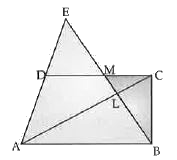2 cubes each of volume 64cm3 are joined end to end . Find the surface area of the resulting cuboid. Solution in Kannada
The correct Answer is:160 sq. cm.
Step by step video, text & image solution for 2 cubes each of volume 64cm^(3) are joined end to end . Find the surface area of the resulting cuboid. by Maths experts to help you in doubts & scoring excellent marks in Class 10 exams.
Topper's Solved these Questions
- BOOK - ZEN PUBLICATIONCHAPTER - SURFACE AREAS AND VOLUMESEXERCISE - TEXTUAL EXERCISES (EXERCISE 15.2)8videos
SURFACE AREAS AND VOLUMES
- BOOK - ZEN PUBLICATIONCHAPTER - SURFACE AREAS AND VOLUMESEXERCISE - TEXTUAL EXERCISES (EXERCISE 15.3)9videos
SURFACE AREAS AND VOLUMES
- BOOK - ZEN PUBLICATIONCHAPTER - SURFACE AREAS AND VOLUMESEXERCISE - ZEE ADDITIONAL QUESTIONS -HOTS [HIGHER ORDER THINKING SKILLS]-QUESTIONS11videos
SURFACE AREAS AND VOLUMES
- BOOK - ZEN PUBLICATIONCHAPTER - STATISTICS EXERCISE - ZEN ADDITIONAL QUESTIONS IIT FOUNDATION5videos
STATISTICS
- BOOK - ZEN PUBLICATIONCHAPTER - TRIANGLESEXERCISE - ZEE ADDITIONAL QUESTIONS - LONG ANSWER TYPE QUESTIONS10videos
TRIANGLES
Similar Questions
A solid in the shape of a cone standing on a hemisphere with both their radii being equal to 1 cm and the height of the cone is equal to its radius. Find the volume of the solid in terms of π.
02:10View SolutionA metallic sphere of radius 4.2cm is melted and recast into the shape of a cylinder of radius 6cm. Find the height of the cylinder.
01:40View SolutionA sector of a circular is of radius 12 cm and angle 120∘. It is rolled up so that two bounding radii are joined together to form a cone. Find the volume of the cone.
01:57View SolutionThe mean of five numbers is 18. If one number is excluded then their mean is 16. Find excluded number.
04:03View SolutionThrought the mid-point M of the sides of a parallelogram ABCD, the line BM is drawn intersecting AC at L, and AD produced to E. Prove that EL=2BL.
 02:06View Solution
02:06View SolutionTwo cubes, each of volume 512 cm3 are joined end to end. Find the surface area of the resulting cuboid.
03:04View SolutiontheTwo cubes each of volume 64cm^(2) ' are joined end to end.Find the total surface area of resulting cuboids.
View Solution2 cubes, each of volume 125 cm3, are joined end to end . Find the surface area of the resulting cuboid.
06:01View SolutionTwo cubes each of volume 125cm3 are joined end to end together. Find the total surface area of the resulting cuboid.
02:52View Solution2 cubes each of volume 64cm3 are joined end to end . Find the surface area of the resulting cuboid.
04:32View SolutionTwo cubes each of volume 64cm3 are joined end to end to find the surface area of the resulting cuboid.
02:39View Solution2 cubes each of volume 64cm3 joined end to end. Find the surface area of the resulting cuboid.
02:27View SolutionTwo cubes each of volume 64cm3 are joined end to end together. Find the surface area of the resulting cuboid.
03:58View Solution2 cubes each of volume 64cm3are joined end to end. Find the surface area of the resulting cuboid.
02:16View Solution2 cubes each of volume 64\ cm3 are joined end to end. Find the surface area of the resulting cuboid.
02:27View Solution2 cubes, each of volume 125 cm3, are joined end to end . Find the surface area of the resulting cuboid.
04:13View Solution
